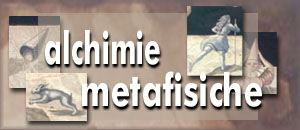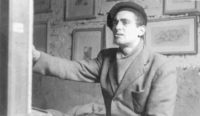|
|
|
|

|



|
Alchimie metafisiche
Solo exhibition of Gustavo Foppiani
vernissage:
15/01/2003
visitors:
86027
 Foppiani is probably the most important artist belonging to the so called "Piacenza School".
Aesthetically speaking, he prefers a crepuscular lyricism and he uses ashen and warn tones for the passing of years on the board, that he subjects to some expert processes of getting old.
It is during the years of surrealistic and abstract landscapes, that he devotes himself to the visual research about the composition.
Now, it is already present the fascination for the "symbol" that continues also during the following phases, when the author concetrates mostly about contents, especially reflecting upon the enigma and the anxiety, creating lively sensations of mistery.
Afterwards, this symbolic-existential component is developped by Foppiani on the scope of the human figure and scenary; so, this is a narrative scenary, animated by the presence of a man, who is like a "homini lupus".
The aggression theme is prevalent, so much that, making a long jump in the time and in the space, we remember the Sartre's causticity.
In fact, in spite of the calcuted "naiveté" of the formal description, of the gratification for the amazement, and of a certain sweet sentimentalism, picks the harschness of the problematic and dangerous situations of the dark atmosphere and of the anatomic deformation.
One of the fundamental themes of Foppiani's works of art is the precariousness, that peeps out in the form of uncertainty. Sometimes this reality is mitigated by the sweetness of love, that sometimes is put on a drammatic relevance, and the author lingers over the instant that compromises the quiet and that preludes the catastrophe.
Thinking about the drammatic victime's experience, Foppiani discusses also the aggression, lingering over the obsession for the guilty, for the accusation, and for the punishement inflicted by the persecutor. These feelings involve psychologically the protagonist with a such a strenght that he is put in a big anguish. Or the aggression acts physically, in an ambiguos and anxious play of disability, or it raises real sentences of death.
But after the tragic moments, the ironic separation phase cannot be absent: this phase is lived with strabilliant energy and presence of mind. It can configure itself as social irony, for example he focuses the empty stylistic feature of the aristocratic portrait, but the ironic distance becomes cinic when it leaves a specific contest in order to become universal....and skeletons in the cupboard appear .
When Foppiani arrives to a global reflection about the existence, suggested for instance by the symbol of book, he expresses himself with calmness, committing to the sollemnity of the theme, the gravity of his conclusions. Foppiani seems to incarnating in his figures, that interrogate the moon with anxious and penetrant glance but that don't receive any answer, because the moon is a dumb witness (and "ll cantico notturno di un pastore errante dell'Asia" of Leopardi comes to our mind).
Gustavo Foppiani was born the 12th july of 1925 in Piacenza and died the 5th august of 1986 in Udine.
Foppiani is probably the most important artist belonging to the so called "Piacenza School".
Aesthetically speaking, he prefers a crepuscular lyricism and he uses ashen and warn tones for the passing of years on the board, that he subjects to some expert processes of getting old.
It is during the years of surrealistic and abstract landscapes, that he devotes himself to the visual research about the composition.
Now, it is already present the fascination for the "symbol" that continues also during the following phases, when the author concetrates mostly about contents, especially reflecting upon the enigma and the anxiety, creating lively sensations of mistery.
Afterwards, this symbolic-existential component is developped by Foppiani on the scope of the human figure and scenary; so, this is a narrative scenary, animated by the presence of a man, who is like a "homini lupus".
The aggression theme is prevalent, so much that, making a long jump in the time and in the space, we remember the Sartre's causticity.
In fact, in spite of the calcuted "naiveté" of the formal description, of the gratification for the amazement, and of a certain sweet sentimentalism, picks the harschness of the problematic and dangerous situations of the dark atmosphere and of the anatomic deformation.
One of the fundamental themes of Foppiani's works of art is the precariousness, that peeps out in the form of uncertainty. Sometimes this reality is mitigated by the sweetness of love, that sometimes is put on a drammatic relevance, and the author lingers over the instant that compromises the quiet and that preludes the catastrophe.
Thinking about the drammatic victime's experience, Foppiani discusses also the aggression, lingering over the obsession for the guilty, for the accusation, and for the punishement inflicted by the persecutor. These feelings involve psychologically the protagonist with a such a strenght that he is put in a big anguish. Or the aggression acts physically, in an ambiguos and anxious play of disability, or it raises real sentences of death.
But after the tragic moments, the ironic separation phase cannot be absent: this phase is lived with strabilliant energy and presence of mind. It can configure itself as social irony, for example he focuses the empty stylistic feature of the aristocratic portrait, but the ironic distance becomes cinic when it leaves a specific contest in order to become universal....and skeletons in the cupboard appear .
When Foppiani arrives to a global reflection about the existence, suggested for instance by the symbol of book, he expresses himself with calmness, committing to the sollemnity of the theme, the gravity of his conclusions. Foppiani seems to incarnating in his figures, that interrogate the moon with anxious and penetrant glance but that don't receive any answer, because the moon is a dumb witness (and "ll cantico notturno di un pastore errante dell'Asia" of Leopardi comes to our mind).
Gustavo Foppiani was born the 12th july of 1925 in Piacenza and died the 5th august of 1986 in Udine.
Alessandra Chiappini
|
|
|


